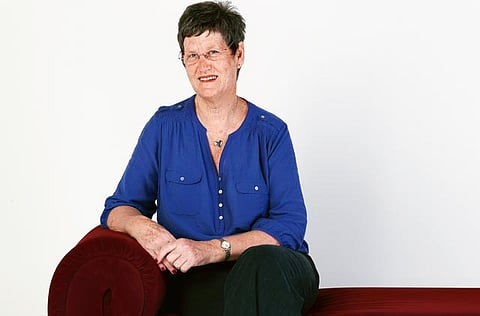On the couch with Helen Williams
LifeWorks’ counsellor Helen Williams talks about the five languages of love and how to raise relationship morale when the bond appears to be broken

“A really common issue I hear all the time is that people are struggling to connect with their partner. I would say every second client I see has this problem and, along with infidelity, it is the number one reason for couples to break up. It’s often relationships that are two or three years old... the gloss has worn off, the cracks are starting to appear, and people begin to really ‘see’ their partners. When this happens, you need to find clear communication paths.
“One of the key factors for communication involves understanding each other’s emotional needs. What does your partner need to do in order for you to feel loved? What do you need to do in order for your partner to feel loved?
“There are five different ‘languages’ of love – meaning five different ways that people give and receive love. These are: physical touch – everything from holding hands to sex; words of affirmation – this can be saying ‘I love you’, or writing little notes, or sending cute texts; giving gifts – where people express their love by buying presents, chocolates, flowers; acts of service – where people show love by doing things, such as cooking dinner or doing the laundry. This is a common language because it is how our parents showed us love as children. And, lastly, spending quality time – for some people the word ‘together’ is very important... ‘Let’s go for a walk together’, or, ‘Let’s take the kids to the pool together’.
“Interestingly, you can use, or speak, lots of different love languages – even within one relationship. Also, opposites often attract, which can mean that two people in a relationship are speaking entirely different languages and not understanding each other. For example, a man might come home from work after a stressful day and want, or need, physical love with his wife, which is one of his languages. And the wife – who needs words of affirmation and gives acts of service – thinks, ‘I’ve cooked you dinner and ironed your shirts and you haven’t even sent me a text message, and now you want sex?’
“The way we give and receive love is a learnt behaviour – one that we learn as a child. However, we all need some level of physical love – some need this more than others and can appear needy, which can drag a relationship down. But understanding how much touch your partner needs, and what kinds of touch, can be really positive in a relationship.
“Loving someone is a choice and choosing to speak your partner’s love language fulfils their basic need for significance, security and self-esteem. It’s about making the choice to fill each other’s emotional tank every day. Discovering your own and your partner’s primary love languages – and choosing to ‘speak’ them – is essential for the growth of a happy relationship.
“Another way of dealing with communication issues is to work out where your emotional issues come from. If you were emotionally wounded as a child, or by a past relationship, it’s not your partner’s job to fix you. Subconsciously, we choose partners who we think can heal us and we believe that our chosen one will instinctively know and understand our needs. This is a huge pressure to put on someone. Also, many people look to their partner to fulfil all of their emotional needs – especially when people are far away from extended families and communities. It’s an unrealistic expectation that will leave you feeling undernourished. If you marry believing this fairy-tale myth, thinking your husband will supply your every need, your hopes will be dashed every day.
“Instead, find your own north on your inner compass and stay true to yourself. Don’t get lost in the idea of being a couple and drown in the relationship – remain individuals. Look at your own emotional injuries and fix yourself. Be aware of your partner’s love languages, and help them feel loved. Having this level of emotional maturity can help a marriage go from strength to strength. And remember, despite what some people say, relationships are really hard work.”


